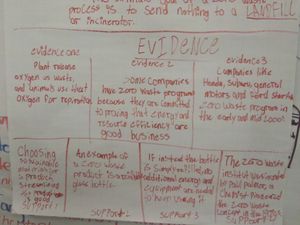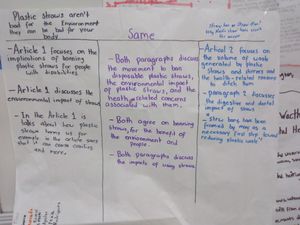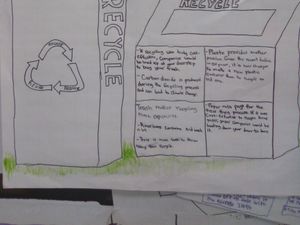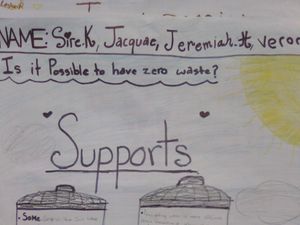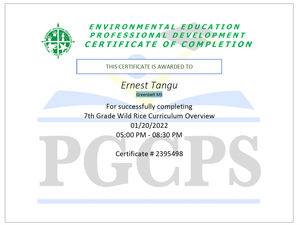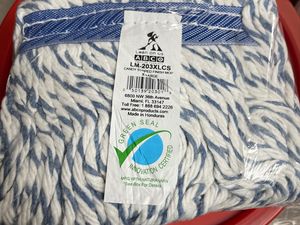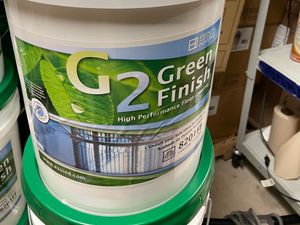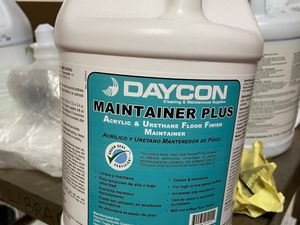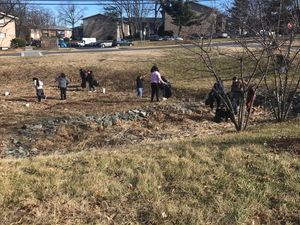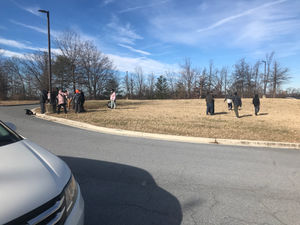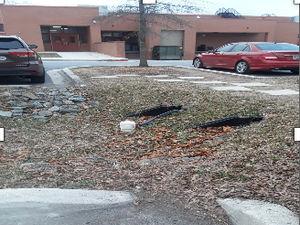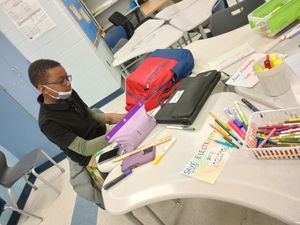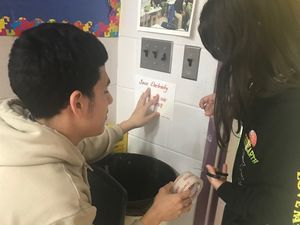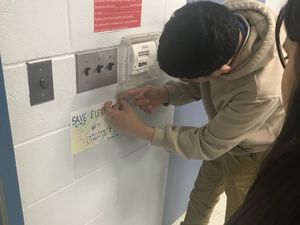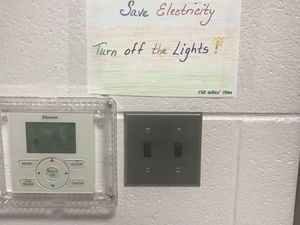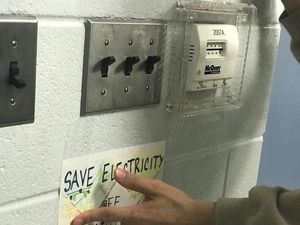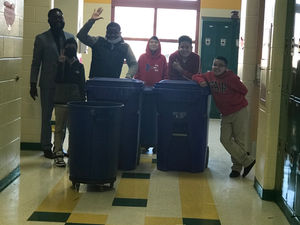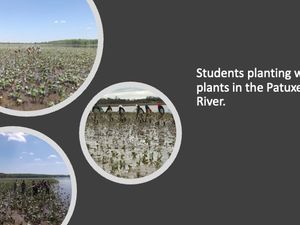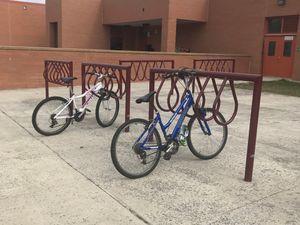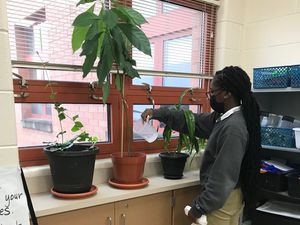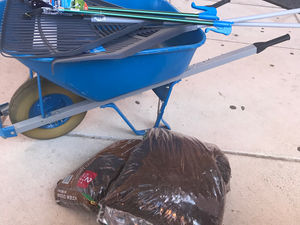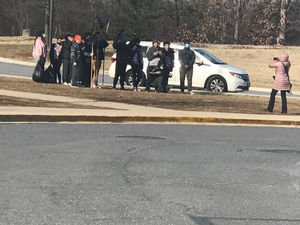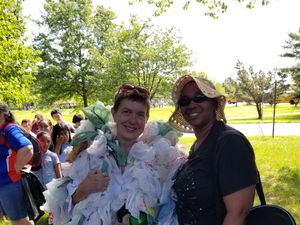Systemic Sustainability
Environmental Curriculum and Instruction
1.1 Curriculum and Instruction
Elementary & middle schools must provide one example of outdoor/environmental instruction per grade level.
High schools must provide one example of outdoor/environmental instruction in four subjects (which may include multiple different differents sciences).
The TERP program provides an opportunity for students to gain real world experience using a hands-on, inquiry approach. Students collect growth data, observe behavior, and care for the diamondback terrapin from October through May/June. The terrapin data that is collected is used to reinforce student’s data analysis skills.
Each year scholars discuss how human impact affects the water supply. Classes complete a lab investigating the affect of Fats, Oils, and Greases on pipes as part of the service learning unit. They create a product to share in the local community. Finally, they assessed whether their outreach was successful.
As part of the Quarter 3 7th-grade RELA curriculum, students focus on the theme: People and the Planet. They explore the questions; "Is Zero Waste possible?", "What is the impact of plastic on the environment?" and "Why is Recycling so expensive?". Students in small groups conduct edresearch and wrote essays on recycling, climate change, natural resource conservation, etc.
Students explore the negative impact of plastic on the environment.
Students explore the feasibility of zero waste.
Students explore the feasibility of zero waste.
Students explore the impact of plastic on the environment.
Students explore the high cost of recycling.
Students explore the feasibility of zero waste.
Students explore the high cost of recycling.
1.2 Green School Awareness
1.2.1 School Wide Awareness - Staff
Demonstrate that all school personnel are aware of your school's Green School status and application process.
Green Team sponsors addressed the staff to relay information regarding environmental education regulations, Green School certification, and Green Team extra-curricular activities.
At the November 2021 staff meeting, the Green Team sponsors gave a presentation on Environmental Literacy and the mission of the Green Team during our monthly staff meeting.
Green Team Presentation 2021 (8.14 MB)
Green Team Powerpoint presentation
1.2.2 School-Wide Celebration
Demonstrate how your school celebrates beig a Green School by hosting a school-wide environmentally-focused event open to all students.
Earth Week School-Wide commemoration Event - 2022
Week long celebration planning outline. Activities will included a parade, student work on display, a school wide symposium, a tree planting, and a Mr/Ms Earth Day contest.
As we were just returning to in-person learning in the spring of 2021, the Green Team held a "Earth Day Everyday' commemoration which took place after Spring Break that year. At that time, we were still under Covid restrictions, so we had teachers include the attached presentation in the Google Classrooms.
Green Team Presentation.pptx (3.38 MB)
Earth Day Our Way presentation.
In 2022 GMS held a Poster Contest which was well recieved by staff and students. The winning posters were displayed and the winning teams celebrated with prizes.
PGCPS Mail - Earth Day Your Way Contest Winners! (136.17 KB)
Email correspondence announcing the winners of the Poster Contest.
Environmental Professional Development for Teachers
1.3.1 Environmental Professional Development for Teachers
Demonstrate that 10% of staff have completed an environmental PD. Instructional staff is defined as any staff that manages a gradebook.
- New Schools must have all PD completed within the past 2 academic years.
- Renewing schools must have all PD completed within the past 4 academic years.
A teacher who has participated in multiple workshops may only be counted once..
Our teachers attended multiple professional development opportunities to facilitate environmental learning. Teachers who are recorded below include: Gonzalo Pitpit Manuela Pagunsan Sharon Thomas Ambrozene Peterkin Ernest Tangu Tabia Muhammad Destiny Charles
Building a MD Green School Attendance The training includes an overview of E-Literacy, steps to becoming a MD Green School, using the Schmidt Center Green School Template, sustainable practice ideas for the classroom and other related Green School content.
Environmental Science Transcripts - Pitpit2 (99.63 KB)
Building a MD Green School attendance certificate
Green Team Meeting and PD for Schools
Environmental Science Transcripts - Pitpit1 (102.11 KB)
Green Team Meeting and PD for Schools attendance certificate
Terrapin Education This professional development is for 8th grade teachers that will be raising terrapin hatchlings with students in the classroom. Learning Outcomes for this PD - 1. To provide TERP program and head starting overview for teachers
- To share how the TERP program can be used as an enrichment and or extension of the science classroom for data analysis.
Pagunsan_T.E.R.P (73.05 KB)
8th Grade Terrapin Education and Research Partnership attendance certificate
7th Grade Wild Rice Curriculum Overview This professional development provides a curricular overview of the 7th Grade Science Student Service Learning Unit -Wild Rice and the Changing Landscape of the Chesapeake Bay Watershed Meaningful Watershed Educational Experience (MWEE). Teachers were introduced to the components of a MWEE by working in breakout groups with facilitators who model each lesson within the unit. Upon completion of this course, teachers will be able to facilitate the student learning process so that students are aware of how their actions may impact the environment.
Pagunsan_Wild Rice Curriculum Overview (72.64 KB)
7th Grade Wild Rice Curriculum Overview attendance certificate
Wild Rice Professional Learning Community This professional development will provide teacher facilitators with research-based environmental literacy strategies to share with teacher colleagues while implementing the wild rice unit in 7th grade science. Upon completion of the professional learning, each facilitator will be able to model the strategies used with teachers assigned to their cohort.
Pagunsan_Wild Rice Facilitator Training (72.59 KB)
Wild Rice Professional Learning Community Facilitator Training attendance certificate
MD Green Schools Program - A Beginner's Guide This course will introduce teachers to the MD Green School Program (MDGS) and guide them through the certification process. Teachers will become familiar with the three core objectives in the program guidelines: Systemic Sustainability, Student-driven Sustainability Practices, and Community Partnerships. The Schmidt Center staff will share ideas and resources on how to accomplish each of the objectives and how the Schmidt Center will support schools throughout the certification window. During the course, teachers are provided opportunities to network and share ideas as well.
7th Grade Wild Rice Curriculum Overview This professional development provided a curricular overview of the 7th Grade Science Student Service Learning Unit -Wild Rice and the Changing Landscape of the Chesapeake Bay Watershed Meaningful Watershed Educational Experience (MWEE). Teachers were introduced to the components of a MWEE by working in breakout groups with facilitators who model each lesson within the unit. Upon completion of this course, teachers will be able to facilitate the student learning process so that students are aware of how their actions may impact the environment.
7th Grade Wild Rice Curriculum Overview This professional development provided a curricular overview of the 7th Grade Science Student Service Learning Unit -Wild Rice and the Changing Landscape of the Chesapeake Bay Watershed Meaningful Watershed Educational Experience (MWEE). Teachers were introduced to the components of a MWEE by working in breakout groups with facilitators who model each lesson within the unit. Upon completion of this course, teachers will be able to facilitate the student learning process so that students are aware of how their actions may impact the environment.
7th Grade Wild Rice Curriculum Overview This professional development provided a curricular overview of the 7th Grade Science Student Service Learning Unit -Wild Rice and the Changing Landscape of the Chesapeake Bay Watershed Meaningful Watershed Educational Experience (MWEE). Teachers were introduced to the components of a MWEE by working in breakout groups with facilitators who model each lesson within the unit. Upon completion of this course, teachers will be able to facilitate the student learning process so that students are aware of how their actions may impact the environment.
1.4 Achieving Sustainable Schools
1.4.1 School-Wide Staff Sustainability
Demonstrate the sustainability practices your teachers, staff, and other personnel have implemented school-wide to make your school green. Any actions involving students belong under Objective 2.
The GMS custodial staff routinely uses Green Seal Certified cleaning products.
Environmentally safe cleaning products used by custodial staff.
Environmentally safe cleaning products used by custodial staff.
Environmentally safe cleaning products used by custodial staff.
Environmentally safe cleaning products used by custodial staff.
Environmentally safe cleaning products used by custodial staff.
1.4.2 Systemic Partnership
Demonstrate one partnership with a central office or board within the school system that supports part of the Maryland Green Schools Program. Any partnerships outside of your school system belong under Objective 3.
Waste Reduction Plan Greenbelt Middle School submits a waste reduction plan to outline how we are managing trash and recyclable items. We also identify goals to continue with waste reduction and facilitate communication within the school and between the school and PGCPS Facilities and Plant Operations.
pgcps-site-waste-reduction-plan-template-2022-2023 (324.79 KB)
22-23 SY Waste Reduction Plan
Student Action
Schools must document eight total actions that address at least three of the listed sustainability practices.
These are student actions not adult actions. Adult sustainable actions can be documented in Objective 1.4.
2.1 Water Conservation/Pollution Prevention
2.1 Water Conservation/Pollution Prevention
Students, staff and community members cleaned up the grounds of the school, reducing pollution flowing into the watershed.
Students preparing to clean up the exterior grounds at GMS.
Students pick up trash around the school.
More trash clean up.
More trash clean up.
Community Service Flyer (44.52 KB)
Day of Service Flyer
2.2 Energy Conservation
2.2 Energy Conservation
Green Team students cleared leaves and debris from the draining areas on school grounds. Clearing the entries allows water to properly drain into the bio-retention pond. Also, removing the leaves and trash helps reduce pollution.
Students create signs to display above light switches throughout the school to encourage energy conservation and reduce our impact on climate change.
2.3 Solid Waste Reduction
2.3 Solid Waste Reduction
Recycling is an ongoing part of the green intiatives at GMS. Students collect recycling from each classroom 3 days a week. Our CRI student Recycling Team works Mondays, Grade 8 works on Wednesdays and Grades 6 and 7 on Fridays.
2.4 Habitat Restoration
2.4 Habitat Restoration
Students restore part of a local river with wild rice plants grown in their classrooms. Through the restoration project, students will increase the Patuxent River filtering capacity and restore natural habitat within the Chesapeake Bay Watershed. Greenbelt students have participated in this local restoration since 2014.
2.5 Opportunities for Nature Exploration
2.5 Opportunities for Nature Exploration
Students often enjoy learning outdoors in the school courtyard. Weather permitting, science, math, social studies, RELA and art classes often spend time in the school's courtyard area. This space provides opportunities/inspiration for artistic creation, earth science exploration, geometric measuring and environmental observation to name a few.
Students use vegetation located in the courtyard planters to gather data, complete creative writing assignments and gain inspiration for artistic sketches.
Science teacher Horace Hines holds class in the courtyard. There are many things to see, hear, and feel in this outdoor space. This year, GMS plans to do more planting in the courtyard to help beautify the area, reduce pollution, and improve air quality.
2.6 Responsible Transportation
2.6 Responsible Transportation
2.7 Healthy Indoor Environments
2.7 Healthy Indoor Environments
Students care for indoor plants to improve air quality and promote water conservation.
Student cares for some of the indoor plants located in Ms. Pagunsan's Science room. These plants are thriving with the ideal amount of sunlight, water and TLC.
Student cares for some of the indoor plants located in Dr. Pitpit's Science room. These plants are thriving with the ideal amount of sunlight, water and TLC.
Student cares for some of the indoor plants located in Dr. Pitpit's Science room. These plants are thriving with the ideal amount of sunlight, water and TLC.
2.8 Citzen/Community/Participatory Science
2.8 Citizen/Community/Participatory Science
No records were added by the school.
Community Partnership
Demonstrate that your school is forming long-term partnerships to foster environmental stewardship and cultivate community wellness through real-world connections.
3.1 Community Partnerships
3.1.1 School Active in Community
Describe at least one environmentally-focused partnership in which your school is working to benefit your community.
Social organization partnered with GMS staff and students to clean up the grounds and plant plants as well as work in the community at other locations like the local recreational center.
Tools and supplies used during Green Up, Clean Up activity.
Students and community organization members cleanup courtyard
Social organization members at GMS
Students on hand for Green Up, Clean Up.
Student and community partners picking up trash on school grounds.
Community Service Flyer__20230310123645 (44.52 KB)
Community Service Flyer
3.1.2 Community Active in the School
Describe at least one partnership in which a community partner is benefitting the school. These actions and projects occur on or near school grounds with support from the partner.
Plant Delivery to GMS from the Schmidt Center.
PGCPS Mail - Green Team_ (321.09 KB)
Email correspondence (re. plant delivery)
Waste Audit
PGCPS Mail - Re_ Waste Audit (496.18 KB)
Email correspondence regarding Waste Audit
Green School Updates for the new academic year.
PGCPS Mail - Action Required_ Waste Reduction_Growing Green w_ Pride (218.9 KB)
Email correspondence regarding Growing Green with Pride program and other information about 2022-2023 school year initiatives.
3.2 Additional Achievements
3.2 Additional Achievements optional
Share any environmentally-related awards, special recognition, certifications, or other achievements that your school, staff or students have accomplished.
Maryland Green Schools gathered at Sandy Point State Park to celebrate the year and recognize the achievements of those schools that took part in the Green Schools Program.






